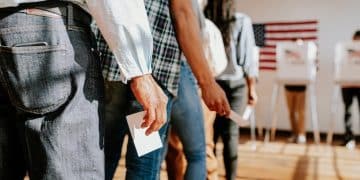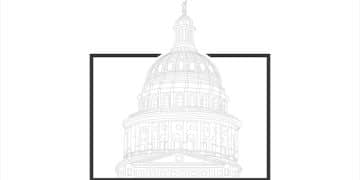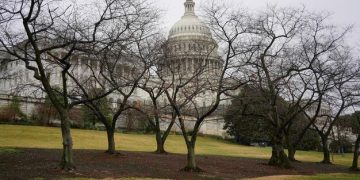The Role of Social Media in the 2024 Election: A Political Analysis

Social media platforms played a pivotal role in the 2024 election, influencing public opinion through targeted advertising, online activism, and the rapid dissemination of information, both accurate and misleading, thereby shaping political discourse and voter behavior.
The 2024 election underscored the significant impact of the role of social media in shaping public opinion: a political analysis of the 2024 election. These platforms have become powerful tools for political campaigns and voters alike, but also present challenges in terms of misinformation and polarization.
Social Media’s Rise as a Political Battleground
Social media has transformed the political landscape in recent years. It’s no longer just a place to connect with friends; it’s now a crucial battleground for political campaigns. Understanding its influence is vital for analyzing the 2024 election.
The Power of Targeted Advertising
Political campaigns have harnessed the power of targeted advertising on social media. By analyzing user data, campaigns can deliver tailored messages to specific demographics, maximizing their impact. This creates echo chambers where individuals are primarily exposed to information confirming their existing beliefs.
Online Activism and Engagement
Social media has also become a hub for online activism. Grassroots movements have used platforms like Twitter and Facebook to organize protests, share information, and engage with political leaders. This allows for wider participation in political discussions, but also carries the risk of spreading misinformation or hyper-partisan content.

Here are key ways social media has affected political engagement:
- Enables rapid sharing of news and information.
- Facilitates fundraising for political causes.
- Connects candidates directly with voters.
- Mobilizes supporters for rallies and events.
In conclusion, social media’s ascent as a political arena is undeniable. Targeted advertising and online activism exemplify how these platforms have been strategically utilized, transforming the way campaigns are run and how citizens engage with politics.
Misinformation and “Fake News”
One of the most significant challenges posed by social media is the spread of misinformation and “fake news.” The ease with which fabricated stories can circulate can significantly impact public opinion. Combating this requires vigilance and media literacy.
The Role of Algorithms
Social media algorithms are designed to enhance user engagement, but they can inadvertently amplify misinformation. By prioritizing content that elicits strong reactions, these algorithms may promote sensationalized or false stories, leading to their rapid spread.
Foreign Interference and Propaganda
Social media platforms have also been targeted by foreign governments seeking to interfere in elections. Through the creation of fake accounts and the dissemination of propaganda, these actors aim to sow discord and influence voter behavior. As many sources claim, this interference is a serious threat to democratic processes.
These are the effects of misinformation on the voters:
- Erosion of trust in traditional media.
- Increased political polarization.
- Confusion and apathy among voters.
- Difficulty in distinguishing fact from fiction.
In short, the issue of misinformation and “fake news” on social media underscores the need for critical thinking and fact-checking. The involvement of algorithms in amplifying falsehoods, combined with foreign interference, makes it a multifaceted challenge to address.
Polarization and Echo Chambers
Social media contributes to political polarization by creating echo chambers where users are primarily exposed to content that confirms their existing beliefs. This can lead to increased animosity and division among different political factions.
The Filter Bubble Effect
The “filter bubble” effect occurs when social media algorithms curate content based on a user’s past behavior, creating a personalized information environment. While this may enhance user experience, it also limits exposure to diverse perspectives, reinforcing existing biases.
The Impact on Civil Discourse
Polarization can have a chilling effect on civil discourse. As individuals become more entrenched in their beliefs, they may become less willing to engage in respectful dialogue with those who hold opposing views. This can hinder cooperation and compromise in the political arena.

Here are problems about social media polarization:
- Worsens political gridlock.
- Undermines social cohesion.
- Creates divides in communities.
- Inhibits constructive debate.
To summarize, social media’s role in promoting polarization and filter bubbles generates divisions and diminishes constructive interaction. By restricting exposure to varied views, individuals grow more rooted in their beliefs, diminishing their desire to engage with different viewpoints.
Campaign Strategies on Social Media
Political campaigns have adapted their strategies to leverage the unique features of social media. From influencer marketing to data-driven microtargeting, social media plays a crucial role in modern campaigning.
Influencer Marketing and Endorsements
Campaigns have increasingly turned to influencers to promote their message. By partnering with popular social media personalities, campaigns can reach new audiences and leverage the trust and credibility that influencers have built with their followers. This approach can be particularly effective with younger voters.
Data-Driven Microtargeting
Social media provides campaigns with access to vast amounts of user data. By analyzing this data, campaigns can develop highly targeted messages tailored to specific demographics and interests. This allows for more efficient and effective campaigning, but also raises ethical concerns about data privacy.
For campaigns, here are the strategies that they use on social media:
- Building a strong online presence.
- Engaging with voters directly.
- Using social media analytics.
- Creating shareable content.
Ultimately, social media campaign tactics have shifted to harness specific platform features, from influencer marketing to data-driven microtargeting. These tactics facilitate candidates’ engagement with new audiences, influencing campaign reach and effectiveness in modern politics.
The Impact on Voter Turnout
Social media’s effect on voter turnout is complex and multifaceted. While it has the potential to mobilize voters, it can also contribute to apathy and disengagement. Let’s look at how social media can mobilize or discourage.
Mobilizing Young Voters
Social media has been credited with mobilizing young voters, who are often underrepresented in elections. By using social media to register voters, share information about candidates, and encourage participation, campaigns can increase turnout among this demographic.
Potential for Apathy and Disengagement
On the other hand, social media can also contribute to apathy and disengagement. The constant barrage of political news and opinions can be overwhelming, leading some voters to tune out altogether. Additionally, the negative tone of much political discourse on social media can discourage participation.
Social media impacts voter turnout in several ways:
- Encourages online registration.
- Facilitates information sharing.
- Promotes political discussion.
- Can also lead to apathy.
The effects of social media on voter turnout are paradoxical. It can either mobilize demographics usually underrepresented in elections or lead to apathy when voters get lost in the sea of news. With these mixed effects, it’s up to individual campaigns to maximize potential for voters.
The Future of Political Discourse on Social Media
As social media continues to evolve, its role in political discourse is likely to become even more prominent. Understanding these trends is essential for voters, candidates, and policymakers. What are the trends we can expect to see as the years go on?
Emerging Platforms and Technologies
New social media platforms and technologies are constantly emerging, each with its own unique features and user base. Political campaigns will need to adapt to these changes in order to stay relevant and effective. Artificial Intelligence should also be taken into consideration given the speed and accuracy it can create content.
Calls for Regulation and Accountability
Growing concerns about misinformation, polarization, and foreign interference have led to calls for greater regulation of social media platforms. Policymakers are grappling with how to balance the need to protect democratic processes with the principles of free speech. The debate around these issues is ongoing.
Social media regulation:
- Data privacy and security.
- Content moderation policies.
- Transparency requirements.
- Campaign finance laws.
Ultimately, the future of political communication on social media is one of adaptation, innovation, and debate. Staying informed of emerging platforms, technologies, and calls for regulations will be key to maintaining a dynamic political environment.
| Key Point | Brief Description |
|---|---|
| 📢 Social Media Influence | Social media platforms have significantly shaped public opinion during elections. |
| ⚠️ Misinformation | The spread of fake news and propaganda poses a significant threat to democratic processes. |
| 🗳️ Voter Turnout | Social media can both mobilize young voters and contribute to apathy among the electorate. |
| 📈 Campaign Tactics | Data-driven microtargeting and influencer marketing are now essential for campaigns to reach voters effectively. |
Frequently Asked Questions
▼
Social media has transformed political campaigns by enabling targeted advertising, direct voter engagement, and rapid information dissemination, allowing campaigns to efficiently reach specific demographics and mobilize supporters.
▼
Misinformation erodes trust in traditional media, increases political polarization, and confuses voters, making it difficult for them to distinguish between factual information and fabricated stories, thus undermining the democratic process.
▼
Social media algorithms can amplify misinformation by prioritizing content that elicits strong reactions. This can also create filter bubbles, limiting exposure to diverse perspectives and reinforcing existing biases.
▼
Influencers help political campaigns reach new audiences and leverage the trust and credibility they have built with their followers. By partnering with popular influencers, campaigns can effectively promote their message to younger voters.
▼
Potential regulations include data privacy and security measures, content moderation policies, transparency requirements, and campaign finance laws. Policymakers aim to balance protecting democratic processes with free speech principles.
Conclusion
The 2024 election made it clear that social media plays a crucial role in shaping public opinion, allowing candidates to connect more readily with potential voters. While the technology can be used to spread information and engage constituents, it also has dark sides, potentially contributing to misinformation, polarization, and foreign interference. As social media continues to evolve, it is important for voters, candidates, and policymakers to understand the potential impacts it has on the political landscape.





